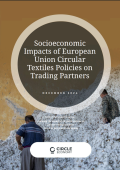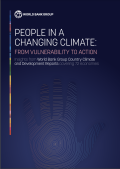
The informal economy is the term used to describe that part of national economies comprised of small and unregulated businesses, plus the product of those whose employment lacks regulation and social protection. The informal economy is significant in terms of GDP share in developing countries. In the late 1990s, the ILO estimated that informal activities accounted for 25 to 50 per cent of GDP in most developing countries. The informal economy accounted for a majority of the total non-agricultural workforces of several countries across Asia, Africa and Latin America in the 1990s (ILO, 2011).
Despite the size of the informal economy it is often excluded by conventional policy making, including green growth strategies. But green growth has the potential to address the challenges of the informal economy. The creation of decent green jobs, promoting more inclusive formal labour markets that provide opportunities for small and informal enterprises, and monitoring social injustice in employment, are all approaches that could empower the informal economy in green growth frameworks.
Relevance to the SDGs
The Sustainable Development Goals (SDGs) address the challenges of informal economy by encouraging formalization of micro-, small-, and medium-sized enterprises (target 8.3) and expanding access to financial services for all (target 8.10).
Explore green growth resources related to SDG 8:
SDG 8.3
Informal Economy SDG 8.8
Labor Rights SDG 8.10
Access to banking
The informal economy, where businesses operate outside of the formal system of regulation and taxation, is a growing sector and often includes the world’s poorest and most vulnerable individuals. The International Labour Organization estimates that 61% of all workers are employed in the informal economy and 94% of the world’s informal employment is in emerging and developing countries. In this sense, the informal economy represents the foundation of the world’s economic development, with informal economy SMEs contributing to more than 50% of the GDP of most countries.
When these businesses implement green practices, they can have powerful and permanent impacts for the community, securing long term raw material supplies, and reducing their vulnerability to climate change risks such as forest fires, floods, and insect outbreaks.






